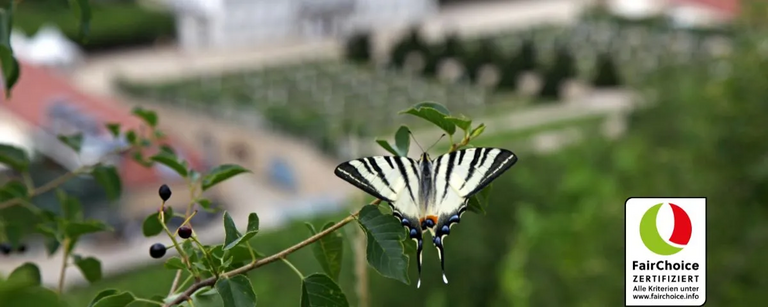Sustainably - Certified with ‘FairChoice’ Certified with ‘FairChoice’
As the Saxon State Winery, Schloss Wackerbarth is committed to the promotion and development of Saxony's wine cultural landscape. Decisive for the sustainable success of our mission is not only the preservation of the listed dry stone walls, but also the ecologically compatible, socially just and economically viable production and marketing of our offerings and products.
For more than a decade, we have been intensively engaged in the natural and sustainable management of our vineyards.
In spring of 2023, we reached a major milestone: we were the first winery in the new German states to be awarded the prestigious "FairChoice" sustainability seal.
The quality of our wines and sparkling wines begins in the vineyard and is perfected in the cellar. With a targeted, resource and environmentally friendly management, we maintain and promote a healthy and intact ecosystem vineyard. At the same time, we preserve the unique wine cultural landscape of Saxony for future generations of winegrowers in the Elbe Valley.
We consistently refrain from using insecticides that are harmful to beneficial insects, mineral fertilizers and chemical herbicides such as glyphosate. They are replaced by measures such as natural, site-adapted planting and extensive, mechanical and manual soil cultivation.
The cultivation of fungus-resistant grape varieties on suitable sites - and the associated reduction of plant protection measures on these areas - also contributes to resource-conserving viticulture: Around 10 percent of all vines in our vineyards today are already so-called PiWis.
"FairChoice" is one of the leading sustainability certifications in the wine industry. Awarded by the German Institute for Sustainable Development, the seal takes into account all three pillars of sustainability - ecology, economy and social issues.
It comprises 47 criteria based on internationally recognized frameworks for sustainability such as the UN Global Compact and the Global Reporting Initiative (GRI). In addition, specifications for controlled environmentally friendly viticulture and guidelines from organic associations are also included in the assessment.

